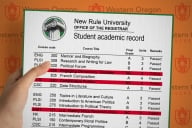You have /5 articles left.
Sign up for a free account or log in.

SDI Productions/E+/Getty Images
Most employers have confidence in a college graduate’s ability to succeed in the workforce. They also value degrees from institutions that expose potential employees to a wide range of viewpoints.
Those are two of the biggest takeaways from a report released today by the American Association of Colleges and Universities. The report is based on a survey of 1,010 executives and hiring managers across the nation about their attitudes on the value of higher education in preparing students for the workforce. It was conducted in May by Morning Consult, a nonpartisan research company.
According to the report, 81 percent of employers said they agreed—either strongly or somewhat—that completing a college degree is worth it, despite the money and time it requires. Eighty-three percent said they felt a college degree equipped graduates for success in the job market.
The findings that employers still place significant value on the power of a college credential come at a time of increased public skepticism about the return on investment a higher education provides. According to a Gallup poll released in July, only 36 percent of Americans have “a great deal” or “quite a lot” of confidence in higher education, which is a decrease of 20 percentage points compared to eight years ago.
The findings also come in an era of increased attempts by some policymakers to control which subjects—and how they are framed—should be taught on campuses.
“Despite the reality that earning a college degree still holds the greatest potential for social mobility, especially for those at the lowest socioeconomic rungs, the politicization of higher education has fueled both skepticism and mistrust,” Lynn Pasquerella, president of the AAC&U, wrote in the foreword to the report. “The report suggests that limiting what can be discussed in college classrooms not only hinders students’ learning but also harms their marketability and employability.”
Diverse Viewpoints
Although this is the eighth iteration of the AAC&U’s employer survey, this was the first time it asked questions about government restrictions on higher education.
According to the report, 86 percent of employers surveyed strongly or somewhat agree that exposure to a wide range of topics and viewpoints is an important contributor to preparing students for the workforce; 82 percent said they thought all topics should be open for discussion on college campuses, and 74 percent said they would look more favorably upon a degree from an institution that was not subject to government restrictions on what students learn and discuss.
That support for diverse thought was widespread across political affiliation and age.
“Employers care quite a bit that students are gaining degrees from institutions that have allowed them to think for themselves,” said Ashley Finley, vice president for research and senior adviser to the president at AAC&U and author of the report. “This jibes with what we’ve found for years, which is employers valuing a job candidate’s ability to work in diverse teams. It’s not really enough to say that employers value teamwork—it’s actually that they value the ability to work in diverse teams.”
But Finley said there was one surprising aspect of the survey’s results: nearly half (49 percent) of employers surveyed said the government should play a role in determining what is taught at colleges and universities.
That view also varied widely by age and political affiliation. Sixty-one percent of employers under the age of 40 said the government should be involved in deciding what colleges can teach, while only 28 percent of employers age 50 and above thought so. Those employers who identified as Democrats were also more likely (61 percent) to favor the government having a role in what is taught, compared to 41 percent of Republicans and 28 percent of Independents who agreed with that statement.
“Statistically, that worked in the opposite direction of what we would have expected,” said Finley, who added that she wasn’t sure how respondents interpreted that question. “I don’t know if that was leaning toward government protection. That was a tricky bit in the findings.”
Shawn VanDerziel, president and CEO of the National Association of Colleges and Employers, said he’d also be interested in the nuances in the interpretations of that question.
“It could be that those under 40 are looking for the government to step in [in] a positive, broad way, that there should be maximum exposure to various viewpoints,” he said. “When you talk to more recent graduates, they are very interested in things like diversity and inclusion and free speech. So, it would surprise me if that group thought government intervention should be very restrictive. It would not surprise me if they thought the government should intervene to ensure that it wasn’t restrictive.”
Employers Value Microcredentials
In addition to asking employers about government restrictions for the first time, the survey also posed new questions about microcredentials. Sixty-eight percent of employers said that if they were to rank a job candidate by their credentials, they would most prefer a candidate who holds both a college degree and a microcredential.
The survey also found that there was little variation in employers’ preferences between hiring a candidate with a microcredential that focused on technical skill versus a broad skill.
“Maybe it’s the new double major, maybe it’s the new concentration, but it’s the packaging that matters,” Finley said. “It’s a wake-up call for colleges and universities to be thinking about how they want to be part of this conversation.”
Nicole Smith, chief economist at the Georgetown University Center on Education and the Workforce, said employers’ preference for both a degree and a microcredential indicates that employers are straddling two worlds.
“Despite all of the backlash against formal degrees, we recognize the huge advantages of a formal degree, particularly with soft skills that you’d need to be successful in a collegial environment which require interpersonal skills,” said Smith, who added that her own research has shown a rising demand for employees with bachelor’s degrees.
A microcredential can supplement those broad skills with more specialized ones.
“In asking for both, they’re improving the human capital of their own employees and pushing that responsibility onto community colleges to train them,” Smith said.
While the AAC&U report showed that a large majority of employers value specific skills such as oral communication, adaptability and flexibility, and critical thinking, it also showed that only about half of employers think students are “very prepared” in those areas.
“If we care about the kinds of skills we know employers value, but we don’t make them explicit to students to be able to tell their story about how they’ve gained these skills, we haven’t fully prepared them,” Finley said. “These skills are now being situated into a new and ever-evolving economic context in which we cannot afford to not be as clear as possible.”








